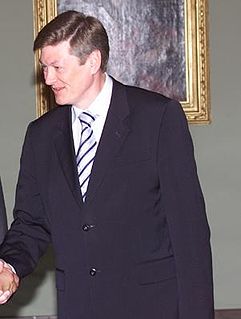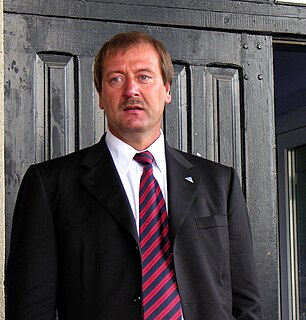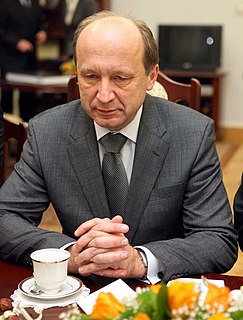| |||||||||||||||||
| |||||||||||||||||
| |||||||||||||||||
| |||||||||||||||||
 |
|---|
| This article is part of a series on the politics and government of Lithuania |
| Constitution |
Legislature |
Judiciary |
Presidential elections were held in Lithuania in June 2004. In the first round on 13 June, the former President, Valdas Adamkus, led the vote tally over the former Prime Minister Kazimira Prunskienė. Adamkus defeated Prunskienė in the second round on 27 June.

Lithuania, officially the Republic of Lithuania, is a country in the Baltic region of Europe. Lithuania is considered to be one of the Baltic states. It is situated along the southeastern shore of the Baltic Sea, to the east of Sweden and Denmark. It is bordered by Latvia to the north, Belarus to the east and south, Poland to the south, and Kaliningrad Oblast to the southwest. Lithuania has an estimated population of 2.8 million people as of 2019, and its capital and largest city is Vilnius. Other major cities are Kaunas and Klaipėda. Lithuanians are Baltic people. The official language, Lithuanian, along with Latvian, is one of only two living languages in the Baltic branch of the Indo-European language family.

Valdas Adamkus is a Lithuanian politician. He was the President of Lithuania from 1998 to 2003 and again from 2004 to 2009.

The Prime Minister of Lithuania is the head of the Government of Lithuania. The prime minister is Lithuania's head of government and is appointed by the President with the assent of the Lithuanian parliament, the Seimas. The modern office of Prime Minister was established in 1990, during the turmoil surrounding the Soviet Union's collapse, although the official title was "Chairperson of the Council of Ministers" until 25 November 1992.
The elections were held following the impeachment of President Rolandas Paksas, who was elected in January 2003. Paksas was impeached for allegedly leaking classified material, and granting citizenship for Russian businessman Jurij Borisov in exchange for financial support. The Constitutional Court of the Republic of Lithuania ruled that Paksas could not seek re-election as president.

Impeachment is the process by which a legislative body levels charges against a government official. It does not mean removal from office; it is only a statement of charges, akin to an indictment in criminal law. Once an individual is impeached, he or she must then face the possibility of conviction by a legislative vote, which judgment entails removal from office.

Rolandas Paksas is a Lithuanian politician who was President of Lithuania from 2003 to 2004. He was previously Prime Minister of Lithuania in 1999 and again from 2000 to 2001, and he also served as Mayor of Vilnius from 1997 to 1999 and again from 2000 to 2001. He has led Order and Justice from 2004 to 2016 and has been a Member of the European Parliament since 2009.

Russia, officially the Russian Federation, is a transcontinental country in Eastern Europe and North Asia. At 17,125,200 square kilometres (6,612,100 sq mi), Russia is by a considerable margin the largest country in the world by area, covering more than one-eighth of the Earth's inhabited land area, and the ninth most populous, with about 146.77 million people as of 2019, including Crimea. About 77% of the population live in the western, European part of the country. Russia's capital, Moscow, is one of the largest cities in the world and the second largest city in Europe; other major cities include Saint Petersburg, Novosibirsk, Yekaterinburg and Nizhny Novgorod. Extending across the entirety of Northern Asia and much of Eastern Europe, Russia spans eleven time zones and incorporates a wide range of environments and landforms. From northwest to southeast, Russia shares land borders with Norway, Finland, Estonia, Latvia, Lithuania and Poland, Belarus, Ukraine, Georgia, Azerbaijan, Kazakhstan, China, Mongolia and North Korea. It shares maritime borders with Japan by the Sea of Okhotsk and the U.S. state of Alaska across the Bering Strait. However, Russia recognises two more countries that border it, Abkhazia and South Ossetia, both of which are internationally recognized as parts of Georgia.
The candidates for the presidency were Adamkus, who had been President from 1998 to 2003 and who was running as an independent, Prunskienė of the Peasants and New Democratic Party Union (NDP), Vilija Blinkevičiūtė of the New Union Party (NS), Petras Auštrevičius (independent), and Česlovas Juršėnas of the Lithuanian Social Democratic Party (LSDP).

Vilija Blinkevičiūtė is a Lithuanian lawyer and politician, Member of the European Parliament and former long-term Minister for Social Security and Labour. Blinkevičiūtė is a member of the Social Democratic Party of Lithuania since 2006.
The New Union Party (NUP) was a small political party in the United States. It was originally formed in 1974 as the New Unionists, several of whom had been members of Section Minneapolis of Socialist Labor Party of America (SLP). As with many such departures since the 1920s, they claimed SLP had become bureaucratic and authoritarian in its internal party structure. In December 1980, New Unionists fused with the League for Socialist Reconstruction (LSR) and two smaller groups and proclaimed the "New Union Party." In that year, New Unionist editor Jeff Miller ran for US Congress in Minnesota's Fifth District, polling 1.4% of the total vote.

Petras Auštrevičius is a Lithuanian liberal politician, diplomat, civil society activist, former member of Seimas, and since 2014, a member of the European Parliament.
The election coincided with the 2004 European Parliament election.













